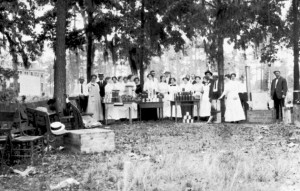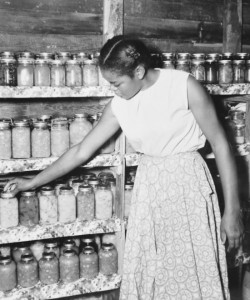When you reach for that can of cranberry sauce or pumpkin pie filling this Thanksgiving, take a moment to thank Extension. Home canning is one of Extension’s first success stories in Florida, leading to both 4-H Youth Development and UF/IFAS’ Department of Family, Youth and Community Sciences.
In 1908, Agnes Ellen Harris, head of the Department of Home Economics at Florida State College for Women (now FSU), began giving home demonstration courses to promote the health and economic benefits of canning fruits and vegetables. Home canning–a relatively new practice at the time–allowed rural families to extend the shelf-life and nutritional value of their harvests, as well as giving them a greater stake in marketing and distributing their produce. The canning courses were so well attended that Harris began establishing ‘tomato clubs,’ organized through public schools around the state.

In the tomato clubs, young women ages 10-18 would learn to plant 1/10 of an acre plot with tomato seeds, grow the tomatoes, can them in sterilized glass or steel containers, and sell whatever couldn’t fit on their pantry shelves. Tomatoes were chosen because they were easy to grow, could be processed in the home kitchen, and were a good source of nutrition. Many of the girls found in the tomato clubs a chance for personal and economic independence, and by 1912, Harris had enrolled over 500 girls in 11 Florida counties. Supported by local businesses and civic organizations such as the Florida Federation of Women’s Clubs, 12 demonstration agents were hired seasonally to organize the clubs and demonstrate growing and canning techniques. Tomato clubs became a part of Florida Extension with the state’s adoption of the Smith-Lever Act in 1915, and federal funds allowed Harris to hire full-time agents, who formed the Home Demonstration component of Extension.
After 1915, home demonstration agents still conducted the tomato clubs, but their mission had now extended to whole families, teaching them the basics of canning fruits, vegetables, milk, meats and fish, as well as sewing, nutrition, food preparation, home improvement and personal finance. Agents travelled by train, buggy, horseback and rowboat to reach rural communities around the state. In 1922, the first school lunch programs in the state were organized by home demonstration agents in Orange and Osceola Counties. During the Depression, home demonstration agents helped rural families survive through bank failures, crop losses and devastating storms. Extension home demonstration continued to expand throughout the century; ultimately it lead to the establishment of the Department of Extension Home Economics, which would eventually ally with what we know today as UF’s Department of Family, Youth and Community Sciences.

Canning is still an important part of UF/IFAS Extension, with modern canning centers established in many areas across the state giving lessons in safe and economical food preservation.
Meanwhile, the Tomato Clubs, together with Corn Clubs for boys, continued to grow in popularity until in 1924 they were officially recognized as 4-H Clubs. Today, 4-H is the nation’s largest youth development organization, serving over 6 million young people.
And to think, it all came out of a can.

 0
0
